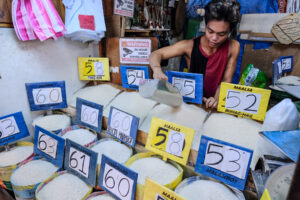TWO COMMITTEES at the House of Representatives on Tuesday approved the proposed amendments to the Rice Tariffication Law of 2019.
The House committees on Agriculture and Food and Ways and Means on Tuesday in separate hearings okayed the amendments, with several measures on the amendments set to be consolidated into a substitute bill.
The unnumbered substitute bill will have to go through the Appropriations Committee before being deliberated in the plenary, Quezon Rep. Wilfrido Mark M. Enverga, who chairs the Agriculture Committee, told reporters on the sidelines of their panel hearing.
The approved amendments include a provision allowing the National Food Authority (NFA) to sell rice to retailers, Marikina Rep. Stella Luz A. Quimbo said in a chance interview, as well as a proposal to increase the annual funding of the Rice Competitive Enhancement Fund (RCEF) to P15 billion from P10 billion.
“Right now, the NFA can only sell (rice) to local government units,” Ms. Quimbo said. “We expanded the list of distribution outlets so they can sell to other entities, to more retail outlets.”
“Rice inflation is still high,” Ms. Quimbo said in mixed English and Filipino. “It’s about time that we passed… the amendments to the Rice Tariffication Law, which expands the power of the NFA so they can intervene in situations where we have extraordinary price increases.”
The House is currently fast-tracking its deliberations on amendments to the law, with President Ferdinand R. Marcos, Jr. on Monday saying he would certify the proposal as urgent, in a bid to lower retail prices of rice products in the market.
House Speaker and Leyte Rep. Ferdinand Martin G. Romualdez last week said amending the Rice Tariffication Law to allow the NFA to buy rice directly from producers would reduce rice prices by as much as P10 to P15 per kilo.
Changes to the law would also include allowing the NFA to import rice, Ms. Quimbo said.
“(The NFA) can rely on importing rice as a last resort if they can no longer buy rice locally,” she said.
Ms. Quimbo said the proposed measure also seeks to increase the annual funding allocation to RCEF to P15 billion as rice tariff revenues from imports reached around P30 billion in 2023.
The bill expands the NFA’s regulatory functions to include warehouse monitoring to prevent rice stock hoarding, she added.
“We expanded the regular mandate of the NFA to include warehousing,” Ms. Quimbo said. “This is one of the “holes” of the Rice Tariffication Law, where the functions of the NFA were removed and not transferred to other agencies.”
Antonio A. Ligon, a law and business professor at De La Salle University in Manila, said allowing the NFA to sell to consumers directly will lead to cheaper prices.
“For one, the distribution costs will be lessened as you eliminate other conduits in the sale of rice,” he said in a Viber message.
Meanwhile, Monetary Board member Bruce J. Tolentino said lawmakers should consider the NFA’s history in deliberating the proposed amendments as the agency was “never successful in ‘buying high’ from all farmers, or ‘selling low’ to all consumers.”
Only “very few favored farmers and consumers benefited” from the NFA’s precious buying power, he added.
“And NFA’s operations cost the Philippine budget a huge amount of money and borrowing, a significant chunk of debt which today remains unpaid,” Mr. Tolentino said.
Debt incurred by the NFA swelled to P165.6 billion from 2000 to 2010 from P5.7 billion from the 1970s until 1998 as the administration of former President Gloria Macapagal-Arroyo gave the agency the power to buy palay at a high price and sell rice at a low price. This, against the backdrop of record 2.35 million metric tons of rice imports.
“The Philippines has the full history and experience with NFA and its performance, cost, and impact on rice prices for both consumers and farmers from the post-World War II years all the way to 2019,” Mr. Tolentino added.
“Congress also has the full record of the legislative investigations and discussions leading up to the passage of the Rice Tariffication Law,” he said. “I hope and trust that the lawmakers make use of the documentation and analysis as they tackle this important and consequential problem.” — Kenneth Christiane L. Basilio and Kyle Aristophere T. Atienza
